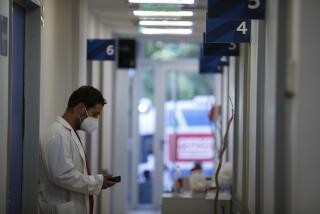Hospitals Aren’t <i> That</i> Hush-Hush
- Share via
PHILADELPHIA — Two doctors were deep in conversation, trying to decide whether it would be best to remove one or two lobes of their patient’s lung.
Their intentions were good, but their supposedly private conference had an uncomfortable captive audience: an elevator filled with people, including the patient’s wife.
Hospital elevators are rife with indiscretion, a Philadelphia researcher concludes after a study of the conversations in five Pittsburgh institutions.
His assistants heard bad jokes about patients and medical workers questioning their own fitness. Worst of all, they heard blatant breaches of patient-doctor confidentiality.
“Everyone talks about their work, but not everyone is under oath to not talk about their work,” says the researcher, Dr. Peter Ubel, a staff physician at the Veteran’s Administration Medical Center and faculty member at the University of Pennsylvania’s Center for Bioethics.
In a report to be published this fall in the American Journal of Medicine, Ubel says doctors are identifying patients and reciting their medical histories within earshot of perfect strangers.
Ethicists agree that doctors need to be more careful, but some question whether confidentiality is possible in large hospitals.
Indiscreet elevator conversations blur the meaning of confidentiality, suggests Bette Crigger, an editor at the Hastings Center, a bioethical think tank in Briarcliff Manor, N.Y. Crigger says the public may expect too much discretion from doctors.
“It’s sort of normal for colleagues to bitch at each other in elevators,” she says.
“The question is whether we hold physicians and health care personnel to a higher standard of etiquette than we hold ourselves.”
Two years ago, Ubel sent researchers to ride elevators at Pittsburgh hospitals and later jot down remarks they found inappropriate or revealing. Ubel refused to identify the five hospitals they visited.
In 259 elevator rides, the researchers counted 41 remarks--one out of every six rides--that threatened patient privacy or raised questions about care.
Comments ranged from inappropriate to bizarre. Some staff members talked of being unprepared for work. “People would come in saying they couldn’t do the job well, they were sick from drinking the night before, or they didn’t think they could operate the equipment they had to use,” Ubel says.
He urges doctors to find private space. But some hospitals aren’t very accommodating.
“For some reasons, the architects never thought of that,” says Dan Dugan, co-director of clinical ethics at Park Ridge Center in suburban Chicago. “Physicians and family members are forced to have conversations in public corridors.”
More to Read
Sign up for Essential California
The most important California stories and recommendations in your inbox every morning.
You may occasionally receive promotional content from the Los Angeles Times.













